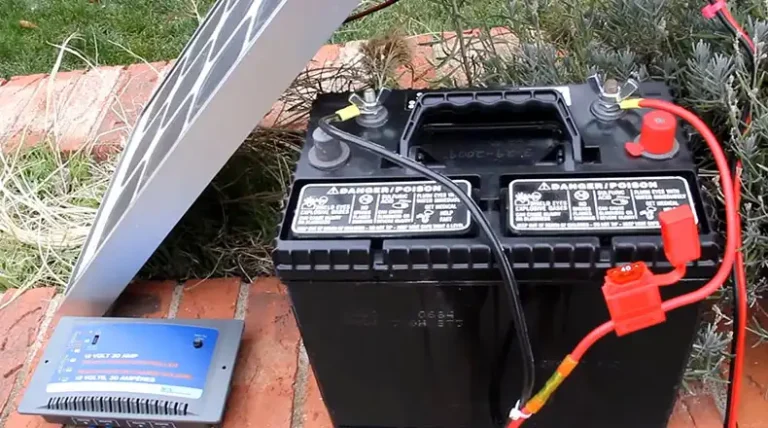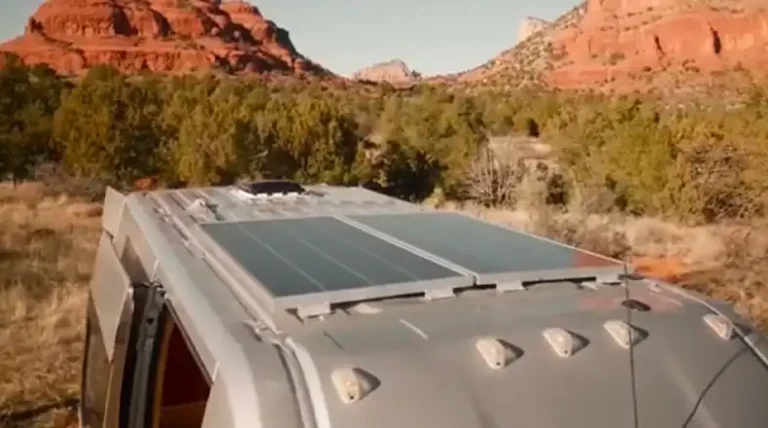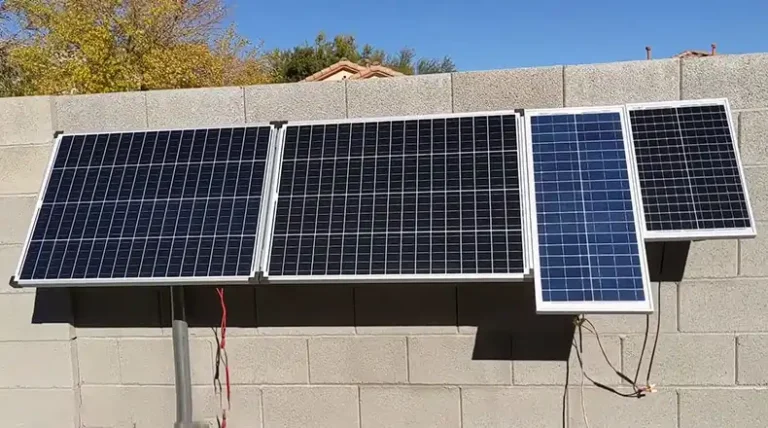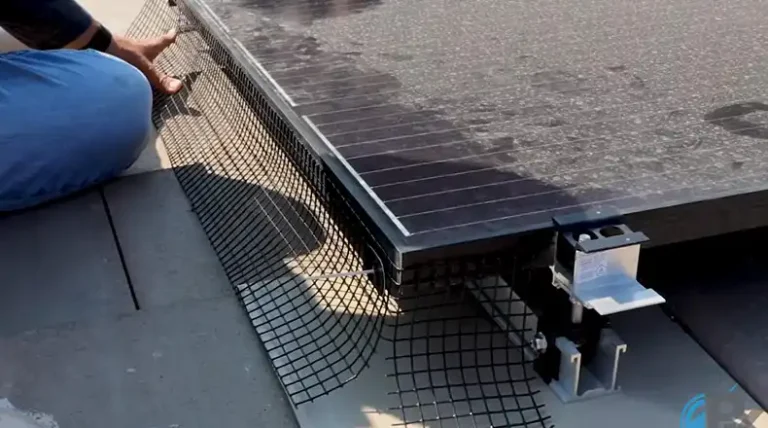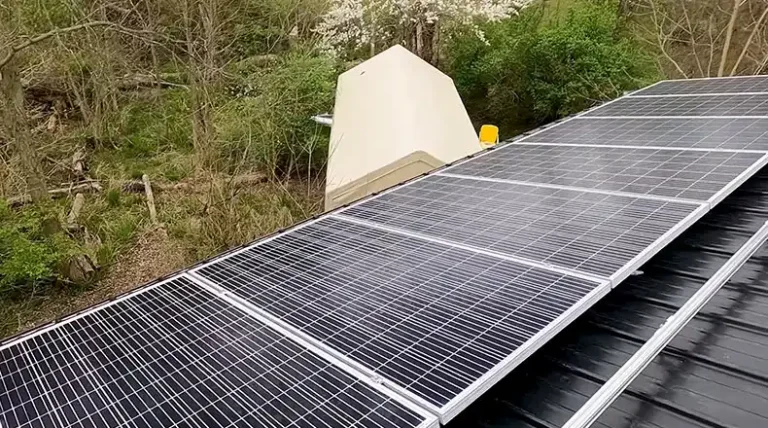[ANSWERED] 100 Watt Solar Panel How Many Amps?
If you’ve dipped your toes into the world of solar power, you’ve likely come across the term “100-watt solar panel.” It’s a popular choice for a wide range of applications, from powering your RV adventures to keeping your home’s lights on during a blackout. But here’s the kicker — comprehending the amperage generated by a 100-watt solar panel isn’t as straightforward as it might seem.
Simply put, a 100-watt solar panel can generate 8.33 amps, 5.55 amps, and 4.16 amps depending on the compatible voltage. That’s just the answer you wanted. But there’s more about this topic and we’ll break down them for you so that things become as crystal clear as a sunny day. You just need to take a few moments and read the article till the end.
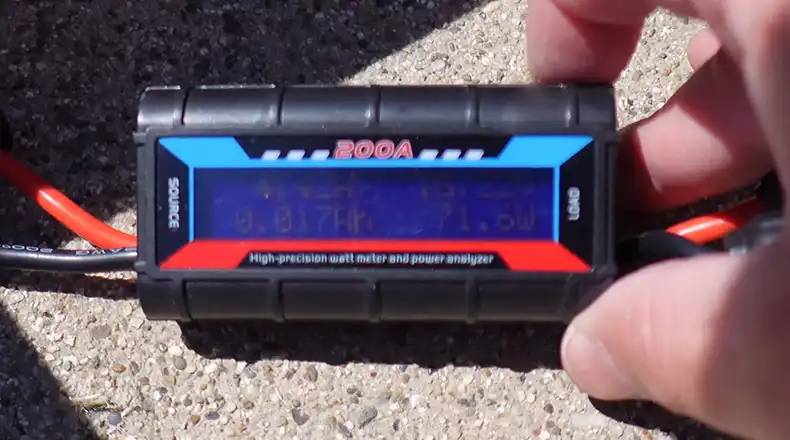
How Many Amps a 100-Watt Solar Panel Can Produce?
A 100-watt solar panel is a compact, energy-harvesting marvel. It absorbs sunlight and converts it into electrical energy, ideal for various setups. But the precious question is, how many amps can you expect from this 100-watt wonder? This amperage measurement is essential for understanding the solar panel’s electrical output, which can be useful for various applications, from charging batteries to powering devices.
In optimal conditions, a 100-watt solar panel performs at its best, generating a total of 100 watts of DC power. 100-watt solar panels are typically available in 12-volt, 18-volt, and 24-volt configurations. The voltage of a solar panel is determined by the number of solar cells connected in series. The higher the voltage, the fewer amps the panel will produce, and vice versa.The formula that determines the actual amp is — Amperage = Wattage / Voltage output.
This is why when it’s a 12-volt 100-watt solar panel, it generates (100/12) or 8.33 amps. For 18 volts, it’s (100/18) or 5.5 amps. Lastly, for 24 volts, the amperage is (100/24) or 4.16 volts.
| Wattage | Voltage | Amperage |
| 100 | 12 | 8.33 |
| 100 | 18 | 5.5 |
| 100 | 20 | 4.16 |
But the fact is the answer is actually more than digits. The actual result mostly varies on some relevant factors. It’s always better to have an idea about them so that you can understand if there’s any difference in the result than the ideal value. But what are they?
Amperage: It’s Not a One-Size-Fits-All Deal
Solar panels have revolutionized the way we harness clean and renewable energy. They are at the forefront of sustainable power generation, and understanding the factors that influence the amperage of solar panels is crucial for optimizing their performance. Those are –
1. Solar Panel Efficiency
The efficiency of a solar panel plays a pivotal role in determining amperage. Not all panels are created equal, and their efficiency varies. As you know now, the standard 100-watt solar panel, under optimal conditions, produces around 5.5 amps. However, real-world efficiency can be affected by factors like shading, dust, and panel quality.
2. Sunlight Intensity
Solar panels operate at their best under direct, intense sunlight. On a clear, sunny day, you can expect your 100-watt panel to hit close to its maximum output. However, during cloudy or overcast conditions, the amperage will drop. It’s like expecting your car to run at top speed in bumper-to-bumper traffic – not gonna happen!
3. Angle and Direction
The direction your solar panel faces and its angle relative to the sun also has a say in the amperage. For instance, a panel facing south and tilted at the optimal angle will produce more amperage throughout the day compared to one facing east or west.
4. Charging Batteries
One of the most common applications for a 100-watt solar panel is charging batteries. You can use this to power up your RV or boat’s batteries. The amperage produced will determine how fast your battery gets juiced up.
5. Off-Grid Living
If you’re living off the grid in a remote cabin, a 100-watt solar panel can be a lifesaver. It can power your essential devices, but to understand if it’s enough, you need to calculate your daily energy consumption.
6. Quality and Cleanliness
To ensure your 100-watt solar panel has the best amperage, invest in high-quality panels, keep them clean, manage shading, and schedule periodic professional maintenance. Monitoring systems help track performance, ensuring optimal amperage output.
Importance of Calculate Amps
In the world of solar power, understanding the importance of calculating amps is akin to having a trusty compass when navigating uncharted waters. Amps are pretty important in terms of power consumption as it measures the current flow, which is basically the rate at which electric charge moves through a circuit.
Tailoring Solar Solutions
Now, let’s relate this to the mesmerizing world of solar panels. Imagine you’re in the market for solar panels, and you have a checklist of appliances and devices you wish to power. Some might be energy sippers, while others are energy gluttons. To avoid surprises and ensure your solar setup matches your needs, you must calculate your amp requirements. This calculation helps you find the right-sized solar panel array.
Let’s illustrate with an example: If you have a device that requires 10 amp-hours (AH) to run for an hour, and you plan to run it for 5 hours, you’d need at least 50 amps to keep it going. Knowing this ensures that your solar panel array generates sufficient amperage to cater to your needs.
The Goldilocks Scenario
Here’s why getting the amps right is like hitting the sweet spot. If you invest in too few solar panels, you’re essentially flirting with the dark side, quite literally. Your energy needs won’t be met, leaving you in the lurch. But overloading on solar panels is also a slippery slope. Batteries have limits. If you’re generating more electricity than you can store, it’s akin to making a feast you can’t finish—wasteful.
In essence, calculating amps not only helps you answer critical questions like, “Is a 100-watt solar panel enough?” or “Can it power a specific appliance?” but also ensures you aren’t shooting in the dark, both metaphorically and quite literally.
Unlocking More Possibilities
Beyond appliance compatibility, knowing your amps opens up avenues to optimize your solar setup. It guides you in determining what size inverter you need to convert DC to AC power, which is essential for using standard power outlets. In other words, it paves the way for you to charge your phone, brew coffee, or watch your favorite show with the power you’ve harnessed from the sun.
Relevant Questions
Can a 100-watt solar panel charge a car battery?
Yes, a 100-watt solar panel can charge a car battery, but the time it takes depends on factors like sunlight intensity and the battery’s condition. On a sunny day, it can provide a substantial charge.
What is the difference between amperage and wattage in solar panels?
Amperage (in amps) measures the current flow, while wattage (in watts) is the power output. Wattage is the product of voltage and amperage. So, in a 100-watt solar panel, the amperage varies depending on voltage.
Can I use a 100-watt solar panel during overcast days?
Yes, you can use a 100-watt solar panel on overcast days, but its amperage will decrease. The panel will still generate some power, just not at its peak output.
Are there any portable 100-watt solar panels for camping?
Absolutely! Many manufacturers offer portable 100-watt solar panels designed for camping and outdoor use. They are lightweight, foldable, and come with features like USB ports for easy charging.
Final Thought
Thus far, you understand that in the world of solar power, the amperage generated by a 100-watt solar panel plays an important role. Remember, the amperage isn’t fixed; it depends on various factors. So, make sure to consider the efficiency of your panel, the sunlight intensity, and the direction it faces. When you’re considering a 100-watt solar panel, it’s not just about the watts — amps matter, too. The amperage determines how quickly you can charge your batteries or power your devices. So, make an informed decision based on your specific needs and the conditions you’ll be working with. The sun’s the limit!
Feel enlightened by our article? Have more questions about solar panels, amps, or anything in between? Feel free to drop your queries in the comments below. We’re here to shed light on your solar concerns and brighten your day. Thanks for reading, and may the sun always shine on your energy endeavors!


